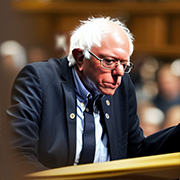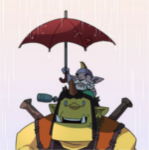|
Deranged Vagrant!
|
|
|
|

|
| # ? Jun 3, 2024 20:55 |
|
deranged vagrant is some victorian-rear end newspaper language
|
|
|
|
|
I have to apologize to the terrible columnists I accused of closing articles to comments earlier; they were enabled later. One of the top 3 comments on Tom Friedman's column said it was so good it made them cry. Anyway I will give credit for some mildly amusing and revealing quotes in this article on (pathetic loser) CEOs who just can't quit: quote:“Everywhere you go, people defer to you,” is what Bob Sutton, a former Stanford professor and an executive adviser, often hears from those resisting retirement. One corporate leader, Toby Cosgrove, told him: “When I became C.E.O. of the Cleveland Clinic, I became better-looking, and my jokes got funnier.” (“There’s no question my jokes got funnier,” Cosgrove told me.) Sutton describes why executives overstay in leadership using a mnemonic device, the four “P”s: power, prestige, privilege and pay. Given that so many are male, one of his colleagues added, there might be a fifth as well. quote:After a C.E.O. spends close to 20 years running a company, and after hauling that company from financial precarity to prosperity, it’s tempting for him to believe that nobody else is qualified for the top job. “You interview a million people, and you will be hard pressed to find anyone who loves his company and loves what they do as much as I do,” says Greg Brown, 63, who has been chief executive of Motorola since 2008. “I don’t even consider it work. I don’t have hobbies.” quote:The chief executive of KnowBe4, a Florida-based cybersecurity company, reacted to the notion of retirement as though he had been nudged to wear his dirty laundry to the office. “Oh my God, retirement? Boo! Hiss!” said Stu Sjouwerman, 67, who has run the company since its founding 14 years ago, waking up at 6 a.m. to chug matcha tea and spending weekends writing newsletters on industry trends for his customers. (“I feel 25!” he told me.) Asked when he would be ready to step down as chief executive, Sjouwerman didn’t skip a beat. quote:O’Reilly, the Stanford professor, remembers speaking with one chief executive who woke up the morning after retiring, agreed to get breakfast with his wife and then unthinkingly got in the back seat of his car expecting to be chauffeured. quote:Stay busy. That’s something that Garry Ridge, 67, the former head of WD-40, has taken seriously. When Ridge stepped down after 25 years leading the household lubricant company, he lined up a bunch of work, including coaching other C.E.O.s on topics like succession, and working on his book, “Any Dumb rear end Can Do It.” Ridge has had to adjust to no longer having his executive assistant, Holly, manage his life. He has recently learned how to use calendar apps. And he confesses that if he hadn’t had shareholders to answer to, he might have handled stepping down differently — less like an ambassador and more like a king.
|
|
|
|
So much makes sense when you realise that CEOs are members of the feudal aristocracy.
|
|
|
|
The New Yoker: Do Children Have a “Right to Hug” Their Parents? the headline got me
|
|
|
|
Clark Nova posted:The New Yoker: Do Children Have a “Right to Hug” Their Parents? I can hear Lucille Bluth saying it so clearly
|
|
|
|
don jr psyching himself up to click
|
|
|
|
 NYT now explaining how poll responders are just mistaken with their wrong beliefs
|
|
|
|
TargetShoplifter posted:
The voters are right
|
|
|
|
Like, it was explicitly a check to see what the reaction would be. And the reaction was "shucks, keep voting blue."
|
|
|
|
Biden is responsible for Thomas being on the court
|
|
|
|
That, too. E: Along with being part of the administration that refused to install Garland. E2: "once the political season is under way, and it is, action on a Supreme Court nomination must be put off until after the election campaign is over." Joe Biden, 1992 Jesus Christ this guy moths has issued a correction as of 18:44 on May 15, 2024 |
|
|
|
Let’s be perfectly clear. I’m sure that Nellie Bowles doesn’t care whether or not I enjoyed her new book, Morning After The Revolution. I’m just a dad in Milwaukee. Last Friday, I volunteered for lunch duty at my kids’ elementary school and a couple of first graders pointed at me and yelled “STRANGER!” when I asked if they needed help opening their milks. No clout whatsoever. Absolute anonymous vibes. Bowles, meanwhile, has spent an entire career writing to an audience many times larger than mine— first at the San Francisco Chronicle, then the New York Times and more recently at The Free Press. She is, like all of us, concerned about other people’s opinions, but I suspect mostly if those people have fancier bylines and larger social media followings than myself. It’s that specific group’s knee jerk progressivism and intolerance to “heterodox” thinkers that serves as Morning After’s origin story. You see, Bowles once toed the elite liberal media party line (she cites such bonafides as supporting universal healthcare, attending a Verso Books/The Nation party and drinking an I’m-with-her-icane the evening of the 2016 election), but that was before the book’s titular “revolution.” After the summer of 2020, Bowles began reporting on woke excesses like the Capitol Hill Autonomous Zone in Seattle and the speaking order at Democratic Socialists of America conferences. She fell in love with a self-proclaimed apostate, the Times writer turned Free Press founder Bari Weiss. Her old friends grew more annoyed with her new opinions, so she, in turn, grew less generous towards theirs. Morning After is a frequently mean-spirited and snarky book. Its appeal is in Bowles’ identity as a turncoat, a former member of the woke mob who broke free. Conservatives in particular love these kind of stories, ones that reinforce tired truisms about how leftism is the domain of the young and naive. Not surprisingly, it’s being praised by the kind of outlets that love sticking it to the wokesters and pilloried by those that Bowles criticizes as borderline Maoist rags. It’s a familiar cycle by this point: cultural criticism as an exercise in flattering one’s preexisting opinions. I wanted to read The Morning After, though, not because I felt a need to jump into a circular firing squad composed primarily of Columbia Journalism School graduates with varying takes on pronouns, but because I am legitimately invested in the book’s ostensible topic. I too wrote a book that wrestles with the limits of leftist self-righteousness, in particular how I tried (unsuccessfully) to cleanse my racial guilt through the studied cultivation of pristine political opinions. And though I assumed that there’d be plenty in Morning After with which I’d take umbrage, I found an excerpt Bowles published last week— about how she regrets jumping on social media cancellation bandwagons in order to maintain her own cool girl capital with other hip big name writers— to be vulnerable and reflective. And so, yesterday I sat down at the kind of coffee shop whose denizens Bowles would likely mock for their hair colors and openness to reparations. I read The Morning After in a single sitting. I was promised laughter and lightheartedness. The book was marketed as a collection of acerbic commentaries on leftist excess in the tradition of Wolfe or Didion (for the record, neither is the funniest writers on my shelf, but I get why an essayist seeking to really jab the New Yorker tote bag set would evoke their names). And it was, to be clear, a breezy read. There are some legitimately fun, well-crafted sentences in there. It’s easy to ride shotgun as Bowles jots down strident protest chants or logs onto an anti-racism Zoom, soaking in the shear tonnage of digital earnestness. But it didn’t leave me cackling, nor did it offend my knee-jerk leftist sensibilities. It mostly just made me sad. Like empty-feeling-in-my stomach, jeez-is-this-who-we-are-to-each-other sad. You want to know what really got me? Remember that cancellation essay? The one that earnestly considered the human cost to a politics of in-group signaling and performative cruelty? That appears at the end of the book, after Bowles has spent pages upon pages being, well, performatively cruel to people with whom she disagrees politically. She doesn’t technically engage in a cancellation, if only because the only people she criticizes by name have long been anti-woke punching bags (former San Francisco prosecutor Chesa Boudin, Black Lives Matter founder-turned-millionaire Patrisse Khan-Cullors, “Characteristics of White Supremacy” author Tema Okun), but there’s a clear pattern as to which characters, over the course of the book, are offered a sympathetic read and which ones merely appear as barely-two-dimensional, origami paper villains. In a particularly illustrative excerpt, Bowles recounts a high-profile homeless encampment in her gentrified Los Angeles neighborhood. Never mind the fact that the majority of houses in the neighborhood now sell in the millions. In Bowles’ retelling, the encampment’s opponent were all salt-of-the-Earth Latino families, whereas everybody who supported it were wealthy White anarchist tourists (she is very concerned that one of the activists owns an expensive car and has rich parents). As is so often the case in these discussions, the homeless themselves are barely granted personhood— they appear in the narrative as a vague miasma of fentanyl and vice. Bowles never interviews any of the tent dwellers, but makes sure to note that when their camp was eventually raided, police found “untold” numbers of machetes (coincidentally, if the police were to raid my house, they would also find an “untold” number of machetes, mostly because we aren’t a society that rigorously documents our machete inventory). Ugh. It’s hard to write about this without resorting to the same easy dunks that the book itself traffics in, so let’s back up. Again, when I finished the book, my first thought wasn’t how eager I was to write a blistering take-down of Morning After’s “wrongthink” in order to curry favor with my leftist readers. I really was thoroughly bummed out. Let’s stick with that feeling. There are, sprinkled throughout the pages of this book, occasional nods at empathy and social concern. But that’s what makes its drive-by cruelty particularly depressing. It’s actually not too hard to simultaneously believe that leftists can be judgmental and group-thinky without being coldly dismissive of trans youth or people living on the streets of San Francisco. Why is Bowles, who earnestly believes that her journalistic curiosity was stifled at The Times when she wouldn’t hew to her colleagues’ liberal beliefs, now so incurious about any of her new books’ progressive subjects? Why does she spend more time, for instance, judging the relative slickness of Minneapolis police abolitionists’ websites than actually talking to them? Why must the pursuit of an ethical life be less about building communities of care than a mere self-conscious hurdle from one insular, gossipy political clubhouse to another? The two specific Didion and Wolfe essays that are often cited in the same breath is the former’s “Slouching Towards Bethlehem” and the latter’s “Radical Chic.” They’re both counterculture critiques, I suppose, but their emotional undercurrent is actually quite different. “Slouching,” a product of Didion short-term residency with the hippies of Haight-Ashbury, is elegiac and heartbroken. The author doesn’t merely mock the longhairs; she mourns a country where kids run away from home, searching for community but mostly finding drugs, trying to re-create adulthood from scratch without the tools or vocabulary to do so. Her characters, a collection of literal lost boys and girls, aren’t heroic, but they are full human beings. In contrast, Wolfe’s sneering profile of a Black Panther fundraiser at Leonard and Felicia Bernstein’s lavish Manhattan penthouse is merely a well-written exercise in shooting fish in barrels. Did you hear the one about the out-of-touch rich person trying to buy revolutionary credibility? I hear Roquefort was involved, the least Maoist of all cheeses. What idiots. Well, back to turning a blind eye to the rise of Ronald Reagan. That’s all to say, I was crossing my fingers that Bowles’ latest would feature more of the former’s empathy and less of the latter’s now-hack recitation of privileged hypocrisies and cringey political silliness. Perhaps that was a naive expectation. After all, Bowles’ bills are currently paid for by an audience with a seemingly unquenchable appetite for jokes about land acknowledgments and “brave” exposes about how some Brooklyn elementary teachers have leftist political opinions. But I do trust Bowles when she writes about her inherent curiosity. So too do I trust the moments in the book where she’s vulnerable, when she questions, if only for a second, the story she already decided to tell before she arrived on the scene. And so, if what I wished for, when I started this book, was a more curious interlocutor, I’d be a hypocrite if I didn’t offer a bit of that in turn. Again, I’m just a dad in Milwaukee. Notably, I’m not a book critic. In my professional and personal life, though, I’ve found that questions are often more useful than opinions. So if I were the kind of person whose social cache mattered to Nellie Bowles, here’s what I’d ask her. There are no gotchas here, no leading questions, and no false sanctimony. What do we have to give each other, after all, if not our curiosity and our honest hearts? Hi Nellie, I hope that your publication day was a joy. When my (first? only?) book came out a couple months ago, I made the mistake of working so hard to calibrate my own emotions that I forgot to celebrate. I hope you were smarter than me. I breezed through your book quickly, which I hope you take as a compliment. There are roughly a hundred books on my shelf that pander much more to my prior convictions that I haven’t finished. And to be clear, your debut was definitely not written for me. I disagreed with far more of your arguments than I agreed. You’ve been around this discursive block before, though, so I’m sure you can anticipate my concerns. I bet you have more than a few counterpoints. Instead of those arguments, though, I thought I’d share a few questions I had after finishing your book. They’re about you and your experience of the past few years. I’m not leading to anything here, and I’m definitely not trying to change your mind. Whether I loved your book or not, you gave a gift of yourself by writing it. This seemed like the least I could do in return. Here’s what I wonder… You don’t dwell on the emotions you felt when you quit the New York Times and left behind many of those friendships, but you do mention that it was (a). your dream job and that you (b). legitimately loved the years when you felt embraced by that community. How did leaving (and feeling abandoned by) that group feel? Especially since it sounds like so many of your old friends really judged (and still judge) your wife? I know that the lesson you took from that departure was that your old community was in the wrong, but are there any doubts there? Do you long for reconciliation there, or just the ability to move on? There are a couple moments throughout the book when you admit to actually getting something from a “progressive” experience that you expected to hate. The first was when you were legitimately moved to tears in a somatic anti-racism course. The second was when your family attended a drag queen tot shabbat at your synagogue and found it… surprisingly theologically deep. What was it about those two political experiences that felt differently from so many of the other experiences you recount in the book? Are there any lessons there, for people trying to build and sustain political movements? This question is more critical and pointed, but it comes from a curious place. I notice that, even when you considered yourself more progressive, so much of your politics was either about (a). movements that directly benefited you (for instance, the fight for gay marriage) or (b). were merely about holding the same beliefs as your peer group. It does seem like many of the movements you judge the most (such as efforts to defund or abolish the police, gain broader acceptance for the trans community, or treat homeless people with dignity) would require more of a lifestyle or behavior change on your part. Does that strike you as accurate? What about those movements, and the changes that they’re requesting of society (and of you personally) scare you? What do you notice about the boundaries between your intellectual critiques and those fears? Do they feel fixed or fuzzy? I notice that throughout the book, you’re particularly judgmental of White activists from rich families. You’re quick to point out whenever an activist holds one or both of those identity markers, often to discredit them. You personally are both White and come from a very wealthy family, a fact that often gets pointed out (in pretty snarky ways) by your critics. Do you feel guilty about those identities? Have they caused you any cognitive dissonance as you’ve attempted to live an ethical life in an unequal society? If so, what has wrestling with that looked like over time? You’re a mom! I love that for you. I know that being a dad has very much changed how I view so many things— my relationship to ambition, my own predilection towards self-righteousness and trying to win arguments, the reasons I even engage with politics, the rawness of my fears for the world, my understanding of my own privilege, my overall level of fatigue, etc. I know it’s hard to talk about how parenthood impacts our politics without settling into easy cliches, but what has that looked like for you? What is your dream for this book? Are you hoping it inspires reflection on the left or that it emboldens moderates and conservatives to defeat me and my fellow leftists? In either case, towards what end? Again, I’ll admit, I’m worried that a book like this hardens and calcifies our political discourse in a way that’s unhelpful. I mean this earnestly, though: I trust that’s not why you wrote it. There’s an aspiration here. What is it? Maybe this is the same question, but what am I misunderstanding about your book? As I’ve made it clear, it depressed me, in that it seemed to give its readers permission to care less and to be less curious about those activists who are challenging the current unequal status quo. Is that a misreading? If so, why? Again, thanks for your work. It made me more curious. And though you and I currently disagree on many things, I can tell that we both at least aspire to be acolytes in the church of curiosity. It’s a beautiful religion, isn’t it? At least for me, it’s a hard one to stay devoted to regularly. I experienced that challenge as I read your book. Heck, I experienced that challenge as I tried writing about your book. That’s the trick, isn’t it. Not being curious, but staying curious. I hope you’re well. For real.
|
|
|
|
Some Guy TT posted:Let’s be perfectly clear. I’m sure that Nellie Bowles doesn’t care whether or not I enjoyed her new book, Morning After The Revolution. I’m just a dad in Milwaukee. Last Friday, I volunteered for lunch duty at my kids’ elementary school and a couple of first graders pointed at me and yelled “STRANGER!” when I asked if they needed help opening their milks. No clout whatsoever. Absolute anonymous vibes. tl;dr
|
|
|
|
i read those and was pleasantly surprised by them
|
|
|
|
moths posted:That, too. the really amazing thing about joe biden is how he's sucked such consistent rear end and always has over five decades in politics makes sense that kamala is his vp too since she is also uniquely lovely and always has been
|
|
|
|
Doc Hawkins posted:i read those and was pleasantly surprised by them Same, it's actually pretty well-written and interesting? I guess I'm missing the punchline. What is it actually from, because I couldn't track down the source.
|
|
|
|
shimmy shimmy posted:Same, it's actually pretty well-written and interesting? I guess I'm missing the punchline. What is it actually from, because I couldn't track down the source. im glad you liked it friend! heres the source https://thewhitepages.substack.com/p/trying-to-be-curious-about-an-incurious
|
|
|
|
Maybe it takes an extraterrestrial event to bring this shredded country together. For a phenomenon that traversed the country from the contentious southern border to the far reaches of New England, Monday’s eclipse attracted remarkably few conspiracy theories or accusations. From where I stood, in Buffalo, the major threat to the moment was a forecast of heavy clouds. Bring on the ominous metaphors: We don’t have the foggiest idea where we’re going. This year, the eclipse passes America by. Here comes the rain again. Perhaps I was too primed to seek meaning, having found unexpected significance in the last major eclipse to cross the country, back on Aug. 21, 2017. I needed it. Wearied by the chaotic churn of Donald Trump’s presidency and desperate for a vacation, I told my family I wanted to see something in this country Trump couldn’t bash, alter, destroy or tarnish. I wanted mountains, rock structures, landscapes and vistas that would give me that sense of This Too Shall Pass, and the planet will still be around. We decided to spend 10 days in South Dakota, starting at Mount Rushmore and ending in the Badlands. I didn’t realize that amid all that permanence, the most fleeting vision would be the most profound. This wasn’t in South Dakota at all; it was a half-day’s drive away in Wyoming. We set out in the early morning on what became clear was a pilgrimage route to the zone of totality. Highways that had been as empty as the prairie during the preceding days were teeming with cars; gas stations had turned into community pit stops selling all manner of eclipse-branded gear and keepsakes. Eclipse Beef Jerky in Lights Out Original flavor, anyone? People had parked at random intervals along the highway, tailgating at a galactic game. I wracked my brain to figure out why our destination, Casper, Wyo., was so familiar — which author’s birthplace, what landmark? — before realizing we were headed to the deep-red hometown of former Vice President Dick Cheney. But the main street of Casper felt more like a global village. More than a million visitors had crowded into the state, a good number of whom descended on a town with a population of roughly 58,000. The main drag had been cleared of cars for the Wyoming Eclipse Festival. A giant map was posted across a stretch of wall with pins available for visitors to signal their place of origin. The U.S. was dotted with pins like a holly in full bloom. No space left to mark anywhere close to New York. But the map of Europe was similarly crowded; people had also traveled from Japan and Patagonia and South Africa. As the moon moved across the sun, a strange banana-yellow cast fell over everything, unlike any natural light I’d ever seen — closer to sepia than twilight. My three kids, then between the ages of 8 and 12, gaped at the way the light struck their hands and morphed the color of their shirts. “It’s a once in a lifetime experience,” my youngest mused aloud, wandering solo into a field in the park where we’d camped out, a short walk from downtown. My older kids seemed almost spooked, waving their arms in the sun’s peculiar glow. Everyone went silent as the sun disappeared. The temperature noticeably dipped. Birds seemed to go quiet. At 11:42, the moment of totality, and with the sun at one with the moon, a palpable unity in the hush down here on earth. Then there was an audible burst of exaltation. Some people say an eclipse brings on a sense of insignificance and solitude in the grand scheme of the universe. I had a slightly different reaction, more of a communal alignment with nature. For this atheist, it was the closest thing to a religious experience, a kind of monolith moment. Here we were, just a bunch of primates, seemingly so advanced in intelligence and power, yet awed in the face of the profound. In search of that same rare feeling, I set out this year for Buffalo. Like many an umbraphile, I booked train tickets the day they went on sale. The rest of my family dropped out when the forecast went grim, but for me, the slightest chance of experiencing totality was worth the risk. In the early afternoon, I parked myself in the Buffalo and Erie County Naval & Military Park, chosen for its proximity to the centerline of totality and for the clear views along the Buffalo River. Food trucks lined up by crowds of families in lawn chairs. People helped one another with their tripods; a roll of duct tape was passed around to fasten the cameras. By 2:02, a few spots of blue dappled the overcast sky. Two minutes into the partial eclipse, the sun broke through, and cheers burst out across the park, as if, against poor odds, we were all urging on the same team. By 2:55, the clouds darkened, and the mood was somber. But each time the sun peeped through, there was another wave of cheers and claps, and boos when the clouds won out. At 3:18, the eclipse reached totality under cloud cover. The park went dark as night. You couldn’t see the sun, but you could feel the eclipse. What looked like a sunset burst along the horizon and the entire park screamed with joy. Sometimes, just sometimes, we all want the same thing.
|
|
|
|
TargetShoplifter posted:
https://www.youtube.com/watch?v=_g7otx-Es-Q&t=7s
|
|
|
|
shimmy shimmy posted:Same, it's actually pretty well-written and interesting? I guess I'm missing the punchline. What is it actually from, because I couldn't track down the source. Agree with you and doc, not a bad article and I usually lose interest a lot sooner
|
|
|
|
Precambrian Video Games posted:I have to apologize to the terrible columnists I accused of closing articles to comments earlier; they were enabled later. One of the top 3 comments on Tom Friedman's column said it was so good it made them cry. what does the president of WD-40 do every day?
|
|
|
|
https://twitter.com/AssalRad/status/1790494231263642030
|
|
|
|
OH OK?!
|
|
|
|
has the nyt considered using a base 10,000 numeral system without disclosing it to readers
|
|
|
|
code:quote:the New York Times is now just laundering straight Israeli intelligence propaganda under the guise of "journalism". Yesterday they published a piece titled "The secret Hamas files".
|
|
|
|
https://twitter.com/tksshawa/status/1790898761222246605 Must have missed footage of Hamas motor rifle divisions running around on Oct 7.
|
|
|
|
Danann posted:https://twitter.com/tksshawa/status/1790898761222246605
|
|
|
|
https://twitter.com/Sallymander40k/status/1791100810165657714?t=T2Wx6eIJ10W3pPxXMiIisw&s=19 I don't bring this up to argue about Assassin's Creed specifically, but as an example of how wikipedia can get (is) politicized.
|
|
|
|
Interesting article from a former producer at the CBC detailing how the sausage is made internally w.r.t. reporting on Israel and Palestine. https://breachmedia.ca/cbc-whitewashed-israels-crimes-gaza-firsthand/
|
|
|
|
PERPETUAL IDIOT posted:Interesting article from a former producer at the CBC detailing how the sausage is made internally w.r.t. reporting on Israel and Palestine. Sadly CBC is probably the best major media org in Canada on Palestine, because they acknowledge there is a side other than Israel.
|
|
|
|
gradenko_2000 posted:https://twitter.com/Sallymander40k/status/1791100810165657714?t=T2Wx6eIJ10W3pPxXMiIisw&s=19 wikipedia is a political project and the people with the least to lose (wikipedia editors) or are backed by a funded team are the ones who win
|
|
|
|
https://www.rollingstone.com/music/music-features/kid-rock-republican-mouthpiece-trump-maga-bff-1235019530/quote:I tell him he’s all right, we just disagree about lots of things.
|
|
|
|
lmao
|
|
|
|
AnimeIsTrash posted:https://www.rollingstone.com/music/music-features/kid-rock-republican-mouthpiece-trump-maga-bff-1235019530/ kid rock apparently is one hell of a performer when he is booked as cruise ship entertainment. He plays more sets than required and parties with the passengers
|
|
|
|
bedpan posted:He plays more sets than required
|
|
|
|
bedpan posted:kid rock apparently is one hell of a performer when he is booked as cruise ship entertainment. He plays more sets than required and parties with the passengers of course he's happy when he's among his people.
|
|
|
|
being a journalist is such an embarrassing job imagine just hanging out for a day with this absolute cretin, and it ends with him calling you gay for saying hey at the end of the day were still fellas
|
|
|
|
AnimeIsTrash posted:being a journalist is such an embarrassing job thinking about that nerd who got his glasses broke by some montana politician who bodyslammed him. eventually, the journalist apologized lol
|
|
|
|

|
| # ? Jun 3, 2024 20:55 |
|
most "journalists" are just ad-funded pr flacks who can get fired by either their advertisers or their subjects
|
|
|










































